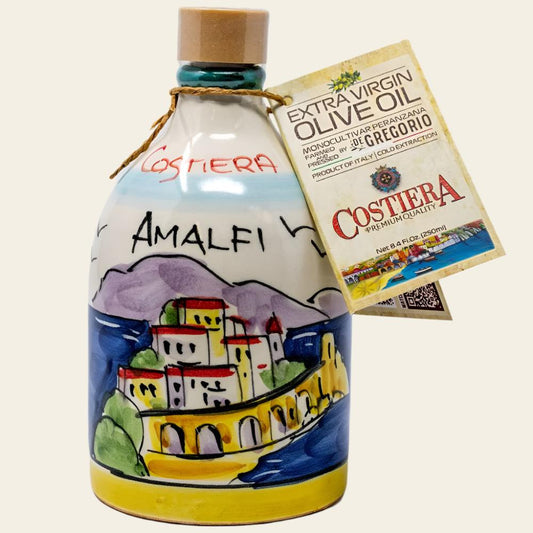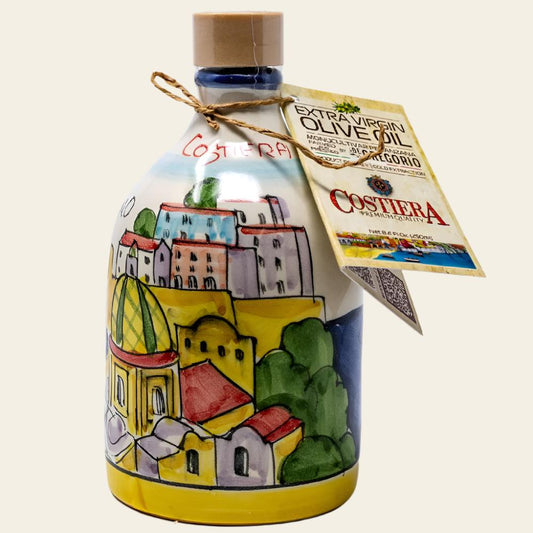

Premium Costiera Extra Virgin Olive Oil made purely from a single variety of olive called "Peranzana" (Monocultivar). These olives have been squeezed in our Oil Mill in Montesarchio (BN, Campania Region), Italy. 100% Product of Italy. First Cold Pressed. Gluten Free Food. This ceramic bottle has been hand made by our crafters on the Amalfi Coast of Italy.
Pompeii: Italy’s Frozen-in-Time Roman City
Pompeii was founded in 600 BC and eventually grew from its Greek and Etruscan roots into a bustling Roman trading city and port. To serve its 20,000 residents, the city boasted more than 40 bakeries, 130 bars, and plenty of public baths. Being a port, it also had brothels, restaurants, and entertainment venues that catered to sailors from all over the Roman world — many of whom didn't speak a lick of Latin. Most of Pompeii's buildings were covered in brilliant white ground-marble stucco, making it an impressive sight. And from its richly decorated forum, people had a postcard-perfect view of the looming volcano, Mount Vesuvius.
Then on October 24, AD 79, everything changed. At about 1 p.m., Vesuvius sent a mushroom cloud of ash, dust, and rocks 12 miles into the sky. It spewed for 18 hours straight, as winds blew the cloud south toward the city. The white-gray ash settled like a heavy snow on Pompeii, its weight eventually collapsing roofs and floors (but leaving walls standing). Though most of Pompeii's residents fled, 2,000 stayed behind. A bad move, because the next morning a red-hot pyroclastic flow struck Pompeii, dealing a fatal blow to those who had remained, and burying the city under 30 feet of volcanic ash.
Ironically, the ash that had destroyed Pompeii also ensured its preservation, leaving it frozen in time. As a result, its ruins offer the best look anywhere at life in an ancient Roman town, with its gridded street plan, villas and homes, commercial buildings, public baths, and colorful frescoes left remarkably intact.
Archeologists uncover ancient Street Food in Pompeii. By Reuters – Dec. 28-2020
Archaeologists in Pompeii, the city buried in a volcanic eruption in 79 AD, have made the extraordinary find of a frescoed hot food and drinks shop that served up the ancient equivalent of street food to Roman passersby.
Known as a termopolium, Latin for hot drinks counter, the shop was discovered in the archaeological park’s Regio V site, which is not yet open the public, and unveiled on Saturday. Traces of nearly 2,000-year-old food were found in some of the deep terra cotta jars containing hot food which the shop keeper lowered into a counter with circular holes. Traces of pork, fish, snails and beef had been found in the containers, a discovery she called a “testimony to the great variety of animal products used to prepare dishes.


For all orders of USD 125+ shipping is offered for free.
Otherwise, standard shipping charges apply. Check out our delivery Terms & Conditions for more details.
Recently Viewed
People Also Bought
Here’s some of our most similar products people are buying. Click to discover trending style.










